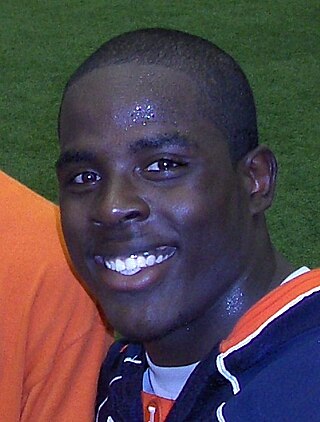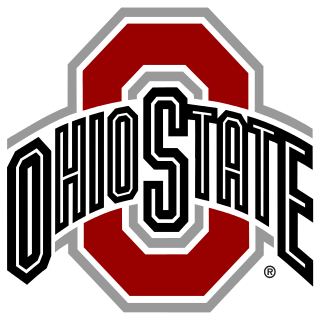
Isiah John "Juice" Williams is a former American football quarterback. He played college football at Illinois. After his senior year of high school in 2005, Williams was considered a top recruit for the quarterback position.

The 2002 Ohio State Buckeyes football team represented Ohio State University during the 2002 NCAA Division I-A football season. The team was the first in NCAA Division I-A—now known as NCAA Division I Football Bowl Subdivision (FBS)—history to finish its season at 14–0 following BYU's 14–1 season in 1996. Led by co-MVPs junior quarterback Craig Krenzel and sophomore wide receiver/cornerback Chris Gamble, freshman standout tailback Maurice Clarett, and senior safety Mike Doss, the Buckeyes won the Big Ten, then won the 2003 Fiesta Bowl, which was also the 2003 BCS National Championship Game, to finish as college football's national champions for the first time since 1968.

The 2006 Wisconsin Badgers football team represented the University of Wisconsin–Madison during the 2006 NCAA Division I FBS football season. Led by first-year head coach Bret Bielema, the Badgers completed the season with a 12–1 record, including a 7–1 mark in the Big Ten Conference, good for a second-place tie with Michigan.

The 2007 Wisconsin Badgers football team represented the University of Wisconsin–Madison during the 2007 NCAA Division I FBS football season. Led by head coach Bret Bielema, the Badgers completed the season with a 9–4 record, including a 5–3 mark in Big Ten Conference play. The season ended with a loss in the Outback Bowl to Tennessee, 21–17.
The 1980 Minnesota Golden Gophers football team was an American football team that represented the University of Minnesota in the 1980 Big Ten Conference football season. In their second year under head coach Joe Salem, the Golden Gophers finished in fifth place in the Big Ten Conference, compiled a 5–6 record, and were outscored by their opponents by a combined total of 250 to 210.

The 2007 Illinois Fighting Illini football team represented the University of Illinois in the 2007 NCAA Division I FBS football season. The team's head coach was Ron Zook. The Illini played their home games at Memorial Stadium in Champaign, Illinois. Illinois entered the season in search of improvement upon a 2–10 record in 2006, and secured bowl-eligibility the first time since 2001 with a homecoming win over Ball State. From weeks 2–6, the Illini won five straight games, their longest win streak since 2001. On November 10, the Fighting Illini upset the then #1 ranked Ohio State Buckeyes at Ohio Stadium in Columbus, Ohio.

The 2008 Illinois Fighting Illini football team represented the University of Illinois in the 2008 NCAA Division I FBS football season. The team's head coach was Ron Zook. The Illini played their home games at Memorial Stadium in Champaign, Illinois. This was Zook's fourth season as the Illini head coach.
The 1990 Iowa Hawkeyes football team represented the University of Iowa in the 1990 NCAA Division I-A football season. The Hawkeyes played their home games at Kinnick Stadium and were led by legendary coach Hayden Fry.
The 1935 Michigan Wolverines football team represented the University of Michigan in the 1935 college football season. In their seventh season under head coach Harry Kipke, the Wolverines compiled a 4–4 record, and were outscored by opponents by a combined total of 131 to 68. The team had a 4–1 record after five games, but was shut out in its final three games. Michigan's 40–0 loss to 1935 consensus national champion Minnesota in the annual Little Brown Jug game was the worst defeat suffered by a Michigan Wolverines football team since 1892.

The 2010 Michigan Wolverines football team represented the University of Michigan in the 2010 NCAA Division I FBS football season. Michigan played its home games at Michigan Stadium in Ann Arbor, Michigan and competed in the Big Ten Conference. The season was the first since the renovation of Michigan Stadium, begun in 2007, was completed. The Wolverines were led by third-year head coach Rich Rodriguez. After its week 10 win against Illinois, Michigan became bowl eligible for the first time since 2007, and later accepted a bid to play in the Gator Bowl against Mississippi State on January 1, 2011, losing 52–14. The Wolverines finished the season sixth out of 120 Division I FBS teams in total offense, 110th in total defense and 112th in passing defense. Michigan finished with an overall record of 7–6, 3–5 in Big Ten play. After the season, head coach Rich Rodriguez and his staff were dismissed on January 5, 2011.

The 2010 Northwestern Wildcats football team represented Northwestern University in the Big Ten during the 2010 NCAA Division I FBS football season. Pat Fitzgerald, in his fifth season at Northwestern, was the team's head coach. The Wildcats home games were played at Ryan Field in Evanston, Illinois. The annual rivalry game against the University of Illinois was played at Wrigley Field on November 20.

The 2011 Wisconsin Badgers football team represented the University of Wisconsin–Madison in the 2011 NCAA Division I FBS football season. The Badgers, led by sixth-year head coach Bret Bielema, are members of the Leaders Division of the Big Ten Conference and played their home games at Camp Randall Stadium. They finished the season 11–3, 7–2 in Big Ten play to be Leaders Division co–champions with Penn State. Due to their head-to-head win over Penn State, the Badgers represented the division in the inaugural Big Ten Championship Game where they defeated Legends Division champion Michigan State 42–39 to become Big Ten Champions. They were invited to the Rose Bowl for the second consecutive year where they were defeated by Oregon 38–45.

The Illinois–Michigan football series is an American college football series between the Illinois Fighting Illini and Michigan Wolverines. The series dates back to 1898 and features two long-time Big Ten members, with Illinois claiming five national championships, 15 Big Ten Conference titles, and 24 consensus All-Americans, and Michigan claiming 12 national championships, 45 Big Ten titles, and 85 consensus All-Americans. Michigan leads the series 72–23–2.

The 1956 Illinois Fighting Illini football team was an American football team that represented the University of Illinois during the 1956 Big Ten Conference football season. In their 15th year under head coach Ray Eliot, the Illini compiled a 2–5–2 record and finished in a tie for seventh place in the Big Ten Conference.
The 1980 Big Ten Conference football season was the 85th season of college football played by the member schools of the Big Ten Conference and was a part of the 1980 NCAA Division I-A football season.
The 1948 Big Nine Conference football season was the 53rd season of college football played by the member schools of the Big Nine Conference and was a part of the 1948 college football season.
The 1956 Big Ten Conference football season was the 61st season of college football played by the member schools of the Big Ten Conference and was a part of the 1956 college football season.
The 1974 Big Ten Conference football season was the 79th season of college football played by the member schools of the Big Ten Conference and was a part of the 1974 NCAA Division I football season.

The 2019 Michigan Wolverines football team represented the University of Michigan in the sport of college football during the 2019 NCAA Division I FBS football season. The Wolverines competed in the East Division of the Big Ten Conference and played their home games at Michigan Stadium in Ann Arbor, Michigan. Michigan was coached by Jim Harbaugh, who was in his fifth season.

The 2019 Illinois Fighting Illini football team represented the University of Illinois at Urbana–Champaign in the 2019 NCAA Division I FBS football season. The Fighting Illini played their home games at Memorial Stadium in Champaign, Illinois, and competed in the West Division of the Big Ten Conference. They were led by fourth-year head coach Lovie Smith.









